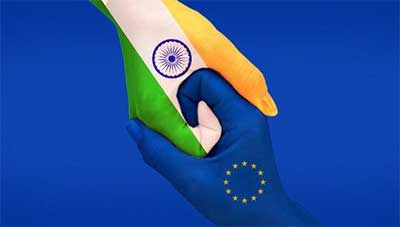India-European Union (EU) leaders’ Meeting
In News
The bilateral ties have deepened between India and European Union (EU) in the leaders’ meeting held at Portugal.
About
Since the first India-EU summit held in 2000, the relations have come a long way. PM Modi attended a virtual meeting that was hosted at Porto, Portugal. EU hardly meets any foreign leader in this format.
Ursula von der Leyen, President of the Commission described it not only an epoch-making and landmark summit, but also an exceptional, outstanding and extraordinary meeting.
The major outcomes include resumption of FTA negotiations, connectivity partnership, artificial intelligence task force and a joint working group on resilient supply chains.
As core of the partnership is economics, the restart of FTA negotiations has the ability to provide a new direction to EU-India ties. Talks on all-inclusive FTA started in 2007. The program included goods and services trade, investment, public procurement, intellectual property and competition.
Recently, Commerce and Industry Minister Piyush Goyal argued for an early harvest or an interim trade agreement along with re-starting FTA negotiations because trades such as textiles, footwear, marine exports, etc. are affected by increase in exports to Europe from Bangladesh, Cambodia and Vietnam. However, India was not able to persuade EU officials who have lately signed comprehensive FTAs with Japan, Singapore, South Korea and Vietnam. The EU is also negotiating ambitious FTAs with Australia and New Zealand.
Actual trade negotiations may take some time to restart. Both parties will start again talks from the point they disengaged in 2013. Although, Brexit and the economic impact of the pandemic may push both parties to re-work their earlier plan of action.
As negotiations may take a few more years to conclude, both have given consent to start side by side negotiations on stand-alone agreements on investment protection and geographical indicators.
With close to $100 billion investment from its 27 member states, the EU is one of the largest investors in India. Likewise, many Indian companies have also invested in the EU.
It is anticipated that an early investment protection agreement may remove ambiguity among EU investors. Some of the market access issues could also be negotiated under this deal. As the EU has recently signed a Comprehensive Agreement on Investment with China, a similar agreement with India can provide fairness with the debates in European institutions.
Negotiations are also put forward for an agreement on geographical indicators (GI). This was also part of comprehensive negotiations earlier. The EU and China have signed a similar agreement recently. The connectivity partnership is expected to expand digital, energy, physical and people-to-people connections between Europe and India. It will help infrastructure projects within India and its neighboring regions. It could also be extended to Africa, Central Asia and the Indo-Pacific. This is mainly based on 2019 EU-Asia connectivity strategy and EU-Japan connectivity partnership.
Unlike the BRI, this partnership will chiefly depend upon multilateral and private sector finance. This alliance can be further associated with evolving EU strategy on the Indo-Pacific and India- Japan initiative on Asia-Africa Growth Corridor.
As India has become global focal point of the pandemic, 20 EU countries have sent oxygen, medical equipment and drugs worth $120 million in the last few days. But India is looking EU support much beyond immediate humanitarian aid. Despite the United States backing for temporary patent waiver for COVID-19 vaccines, the EU is still skeptical to the India-South Africa proposal at the WTO. The EU may need to look at the proposal as part of its development policy rather than its industrial strategy.
New Delhi has affirmed the leaders’ meeting as a defining moment in the India-EU strategic partnership. As EU has full expertise in trade and investment matters, the results of meeting can provide right thrust to bilateral ties.









